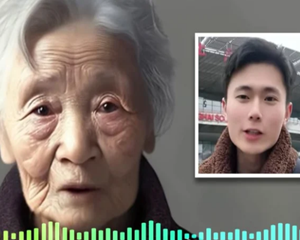Wu Wuliu, a visual designer based in Shanghai, recently stirred significant controversy online when he used artificial intelligence to "resurrect" his late grandmother and engaged in a conversation with her.
近日,上海一位名叫吴伍六的视觉设计师在网上引发了巨大争议,因为他使用人工智能“复活”了自己已故的奶奶,并与她进行了“对话”。
Wu came up with the idea to "bring her back" by mimicking his late grandmother's appearance, voice, personality and memories through AI applications.
通过人工智能应用程序模仿已故奶奶的外貌、声音、性格和记忆,吴伍六萌生了“让她复活”的想法。
He input several photos of his grandmother into the programs to create a lifelike avatar and uploaded her verbal messages to simulate her voice and accent.
他将奶奶的几张照片输入到程序中,创建了一个栩栩如生的图像,并上传了她的语音信息,以模拟她的声音和口音。
Finally, he turned the AI-generated language into conversations that might happen between him and his grandmother.
最后,他把人工智能生成的语言变成了可能发生在他和奶奶之间的对话。
Following the release of the video, it quickly gained popularity on Bilibili.
在发布后,该视频迅速在哔哩哔哩上走红。

However, the comments section was filled with heated debates.
但是评论区却充斥着激烈的争论。
Some netizens said that they were deeply moved by the video, as it reminded them of their own deceased loved ones.
一些网友表示,他们被这段视频深深感动了,因为它让他们想起了自己已故的亲人。
They believe that such actions help to convey their grief and are meaningful.
他们认为这样做有助于表达他们的悲伤,很有意义。
On the other hand, many netizens could not accept Wu's approach, claiming it to be "disrespectful of life" and only reflecting one's own obsessions.
不过也有不少网友无法接受吴伍六的做法,认为这是“对生命的不尊重”,只是反映了自己的执念。
There were also concerns that scammers might take advantage of AI technology for fraudulent purposes.
还有人担心,骗子可能会利用人工智能技术进行欺诈。













